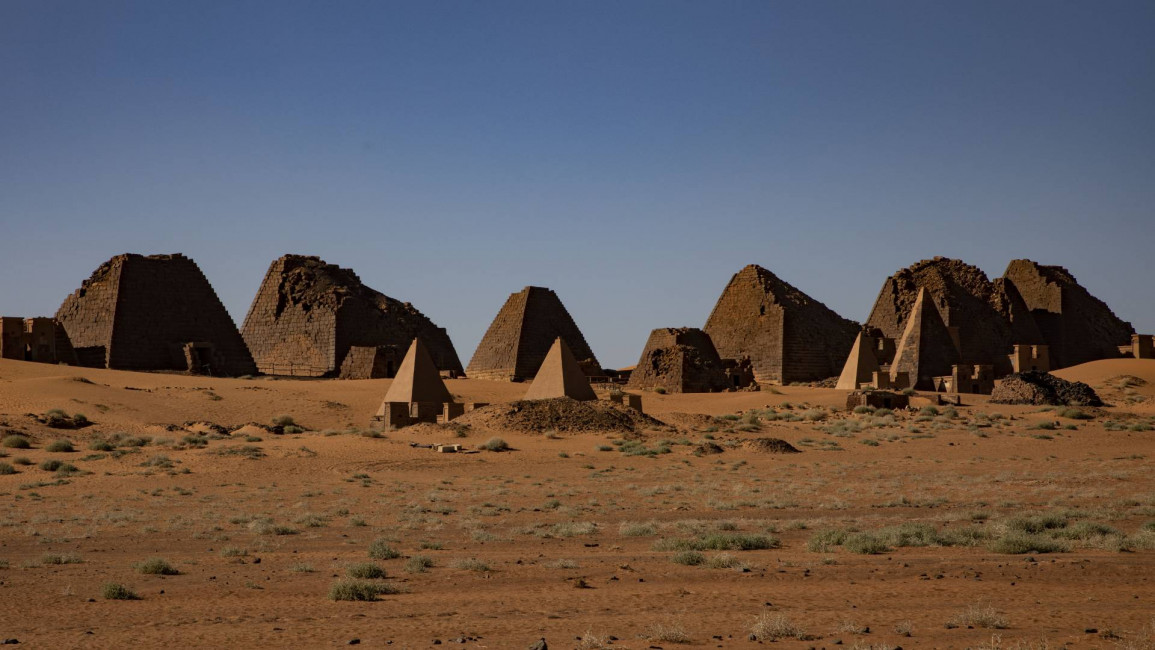Deadly floods threaten ancient Sudan pyramids: official
Deadly floods threaten ancient Sudan pyramids: official
The record flooding that has killed more than 100 people and made tens of thousands homeless now threatens Sudan's historic pyramids.
2 min read
The pyramids were built by the Kushites [Getty]
Torrential flooding in Sudan poses a danger to the country's foremost heritage sites - the royal pyramids of Meroe and Nuri - an official said on Tuesday.
Hatem Al-Nour, director of Sudan's antiquities and museums authority, said the deadly floods have reached areas that house the pyramid structures, threatening their existence.
Meroe was the last capital of the Kingdom of Kush, a Nubian power that ruled over much of northern Sudan between 1070 BC and 350 AD with ties to the 25th dynasty of Egypt. Nuri served as a royal necropolis of the kingdom near its first capital, Napata.
The pyramids at Meroe are a UNESCO World Heritage site, while Nuri is the burial site of Taharqa, a pharoah who ruled over northern Sudan and southern Egypt.
Tombs at Nuri which constitute "invaluable historical relics" have been affected by the rise in groundwater, Nour said, according to Daily Sabah.
Hatem Al-Nour, director of Sudan's antiquities and museums authority, said the deadly floods have reached areas that house the pyramid structures, threatening their existence.
Meroe was the last capital of the Kingdom of Kush, a Nubian power that ruled over much of northern Sudan between 1070 BC and 350 AD with ties to the 25th dynasty of Egypt. Nuri served as a royal necropolis of the kingdom near its first capital, Napata.
The pyramids at Meroe are a UNESCO World Heritage site, while Nuri is the burial site of Taharqa, a pharoah who ruled over northern Sudan and southern Egypt.
Tombs at Nuri which constitute "invaluable historical relics" have been affected by the rise in groundwater, Nour said, according to Daily Sabah.
Nubian rulers continued to build pyramids long after the Egyptians changed their burial rituals, meaning that there are many more examples of the ancient architecture in Sudan than in the borders of its northern neighbour.
Authorities are now rushing to prevent damage to the pyramids, building sandbag walls and pumping out water according to archaeologist Marc Maillot.
"The situation is currently under control, but if the level of the Nile continues to rise, the measures taken may not be sufficient," Maillot was quoted as saying by AFP.
This year's floods are the worst on record.
While farmers have long relied on Nile floodwaters to create fertile land, flooding this year has affected more than 500,000 people according to authorities.
More than 100 people have died and tens of thousands have been made homeless.
The transitional government last week announced a three-month state of emergency to combat the catastrophe.


![Minnesota Tim Walz is working to court Muslim voters. [Getty]](/sites/default/files/styles/image_684x385/public/2169747529.jpeg?h=a5f2f23a&itok=b63Wif2V)




![An Israeli air strike on Jabalia killed teenage journalist Hassan Hamad [Screengrab/X]](/sites/default/files/styles/image_330x185/public/2024-10/hassan%20hamad1.jpg?h=c12e0b96&itok=Rd_dyCVp)

![Israeli strikes on Beirut [Getty]](/sites/default/files/styles/image_330x185/public/2176155077.jpeg?h=a5f2f23a&itok=Xq7ypWgM)